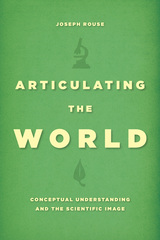
In Articulating the World, Joseph Rouse argues that the most pressing challenge for advocates of naturalism today is precisely this: to understand how to make sense of a scientific conception of nature as itself part of nature, scientifically understood. Drawing upon recent developments in evolutionary biology and the philosophy of science, Rouse defends naturalism in response to this challenge by revising both how we understand our scientific conception of the world and how we situate ourselves within it.

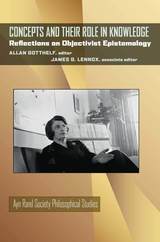
The philosopher and novelist Ayn Rand (1905–1982) is a cultural phenomenon. Her books have sold more than twenty-eight million copies, and countless individuals speak of her writings as having significantly influenced their lives. Despite her popularity, Rand’s philosophy of Objectivism has received little serious attention from academic philosophers.
Concepts and Their Role in Knowledge offers scholarly analysis of key elements of Ayn Rand’s radically new approach to epistemology. The four essays, by contributors intimately familiar with this area of her work, discuss Rand’s theory of concepts—including its new account of abstraction and essence—and its central role in her epistemology; how that view leads to a distinctive conception of the justification of knowledge; her realist account of perceptual awareness and its role in the acquisition of knowledge; and finally, the implications of that theory for understanding the growth of scientific knowledge. The volume concludes with critical commentary on the essays by distinguished philosophers with differing philosophical viewpoints and the author’s responses to those commentaries.
This is the second book published in Ayn Rand Society Philosophical Studies, which was developed in conjunction with the Ayn Rand Society to offer a fuller scholarly understanding of this highly original and influential thinker. The Ayn Rand Society, an affiliated group of the American Philosophical Association, Eastern Division, seeks to foster scholarly study by philosophers of the philosophical thought and writings of Ayn Rand.


The monumental Harvard Encyclopedia of American Ethnic Groups is the most authoritative single source available on the history, culture, and distinctive characteristics of ethnic groups in the United States. The Dimensions of Ethnicity series is designed to make this landmark scholarship available to everyone in a series of handy paperbound student editions. Selections in this series will include outstanding articles that illuminate the social dynamics of a pluralistic nation or masterfully summarize the experience of key groups. Written by the best-qualified scholars in each field, Dimensions of Ethnicity titles will reflect the complex interplay between assimilation and pluralism that is a central theme of the American experience.
The tightening and loosening of ethnic identity under changing definitions of “Americanism” is emphasized in this volume.
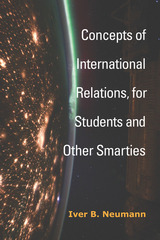
In a relaxed style, Neumann introduces the long-term historical emergence of concepts such as state (European), state (global), empire, nonstate agents, foreign policy, state system, nationalism, globalization, security, international society, great powers, diplomacy, war and peace, balance of power, international law, power and sovereignty, intervention, gender, and class. He demonstrates how such phenomena have been understood in different ways over time. First, the reader learns how the use of concepts is an integral part of politics. Second, the reader sees how social change has worked in the past, and is working now. Third, the book demonstrates how historical and social context matters in ongoing international relations.


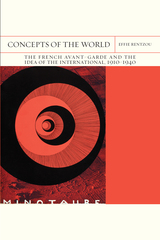
The writers and artists of the French avant-garde aspired to reach a global audience that would be wholly transformed by their work. In this study, Effie Rentzou delves deep into their depictions of the interwar world as an international and modern landscape, one marked by a varied cosmopolitanism. The avant-garde’s conceptualization of the world paralleled, rejected, or expanded prevailing notions of the global sphere.
The historical avant garde—which encompassed movements like futurism, Dada, and surrealism—was self-consciously international, operating across global networks and developed with the whole world as its horizon and its public. In the heady period between the end of the Belle Époque and the tumult of World War II, both individual artists (including Guillaume Apollinaire, Blaise Cendrars, Francis Picabia, Louis Aragon, Leonora Carrington, and Nicolas Calas) and collective endeavors (such as surrealist magazines and exhibitions) grappled with contemporary anxieties about economic growth, imperialism, and colonialism, as well as various universalist, cosmopolitan, and internationalist visions. By probing these works, Concepts of the World offers an alternative narrative of globalization, one that integrates the avant-garde’s enthusiasm for, as well as resistance to, the process. Rentzou identifies within the avant-garde a powerful political language that expressed the ambivalence of living and creating in an increasingly globalized world—a language that profoundly shaped the way the world has been conceptualized and is experienced today.
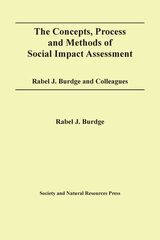
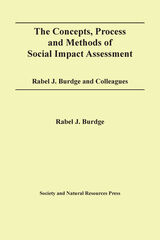
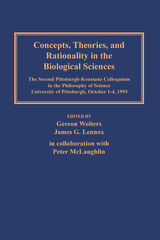
In October 1993, the University of Pittsburgh hosted the Second Pittsburgh-Konstanz Colloquium in the Philosophy of Science, with a focus on the rapidly growing field of philosophy of biology. An interdisciplinary group of philosophers and scientists came together to discuss the basic theories and concepts of biology and their connections with ethics, economics, and psychology. The colloquium organizers strove to create an event that would provide attendees with a wide overview on the current state of the philosophy of biology, with as many topics and views on these topics as possible. Those presentations are gathered here in a volume that offers the reader a varied and thorough survey of the field.

Concepts, Theories, and the Mind-Body Problem was first published in 1958. Minnesota Archive Editions uses digital technology to make long-unavailable books once again accessible, and are published unaltered from the original University of Minnesota Press editions.
This is Volume II of the Minnesota Studies in the Philosophy of Science, a series published in cooperation with the Minnesota Center for Philosophy of Science at the University of Minnesota. The series editors are Herbert Feigl and Grover Maxwell, who are also co-editors, with Michael Scriven, of this volume.
The ten papers by eleven authors which make up the content of this volume are the result of collaborative research of the Center in philosophical and methodological problems of science in general and psychology in particular. The contributors are Paul Oppenheim, Hilary Putnam, Carl G. Hempel, Michael Scriven, Arthur Pap, Wilfrid Sellars,
H. Gavin Alexander, P.F. Strawson, Karl Zener, Herbert Feigl, and Paul E. Meehl. In addition, an extensive discussion of "Internationality and the Mental" by Wilfrid Sellars and Roderick Chisholm is presented in an appendix.In a review of this volume the journal Psychiatric Quarterly commented: "These essays will not prove easy for the layman to read, but he can hardly fail to find his effort rewarded if he is persistent. For the professional behavioral scientist increased awareness and caution—in his use of scientific language, and thinking about scientific theory—should result."
One of the papers in this volume, "The 'Mental' and the 'Physical'" by Herbert Feigl, has been published by the University of Minnesota Press with further discussion by Dr. Feigl as a separate book, The "Mental" and the "Physical": The Essay and a Postscript.
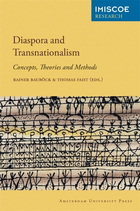
Diaspora and transnationalism are concepts that have become very popular in modern academic and political discourses. And while most of the new literature treats the two separately, this book studies these fields alongside one another. Rainer Bauböck and Thomas Faist bring together scholars from a wide range of academic disciplines to discuss the concepts, theories, and methodologies used in the study of border-crossing affiliations.
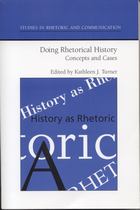
and as a perspective, offers insights that are central to the study of
communication and unavailable through other approaches.
The current field of communication derives from the historical study
of rhetoric. Over the last few decades, however, as the trend toward theoretical
conceptions has driven analysis and as a host of "isms" has defined
criticism, communication studies have moved away from a predominantly historical
perspective.
Yet many scholars in the field continue to find benefits in rhetorical
history. In the thirteen essays gathered here, eminent scholars address
the ongoing dialogue over the regrounding of rhetorical study and the relationship
between theory and history as well as history and criticism in the field.
Some examine the conceptual issues involved in the juncture of rhetoric
and history; others offer case studies, often based on research with primary
documents, to illustrate the process and promise of rhetorical history.
Collectively, their work tests theory and complements criticism while standing
as a distinct and valid approach in and of itself.
The conceptualizations and methodologies of rhetorical history will
increase in significance during the burgeoning "Communication Age"
as we seek to cope with the present and prepare for the future by better
understanding the past. This volume serves as an excellent overview of
a recently neglected methodological approach and acts as the first step
in ending that neglect.
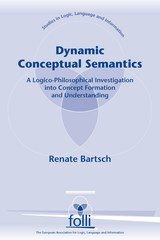
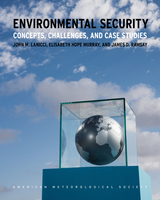
The purpose of text is to better address the many aspects of environmental security and to represent this major area of academic research in an introductory text format that can be used in the rapidly growing number of homeland security studies programs as well as related degree programs. The concepts, challenges, and case studies in this text vitally extended such curricula, giving students a deeper appreciation for the critical role environmental security plays in overall state security, as well as for our nation, our way of life, and indeed for the human race at large.
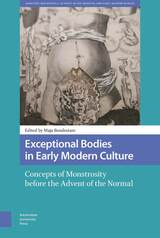

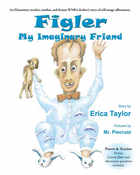
Jeanine Wood - Distance Learning Coordinator Northeast Arkansas Education Cooperative Walnut Ridge, Arkansas
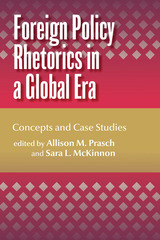
Among the cases researched in this collection are foreign policy rhetoric from Cold War foreign policy in Latin America, the rhetoric of Vladimir Putin’s Ukraine war messages, and the development challenges of the Ford Foundation and the Kenya Women Finance Trust, among many others.

In the 1850s, "Drapetomania" was the medical term for a disease found among black slaves in the United States. The main symptom was a strange desire to run away from their masters. In earlier centuries gout was understood as a metabolic disease of the affluent, so much so that it became a badge of uppercrust honor—and a medical excuse to avoid hard work. Today, is there such a thing as mental illness, or is mental illness just a myth? Is Alzheimer's really a disease? What is menopause—a biological or a social construction?
Historically one can see that health, disease, and illness are concepts that have been ever fluid. Modern science, sociology, philosophy, even society—among other factors—constantly have these issues under microscopes, learning more, defining and redefining ever more exactly. Yet often that scrutiny, instead of leading toward hard answers, only leads to more questions. Health, Disease, and Illness brings together a sterling list of classic and contemporary thinkers to examine the history, state, and future of ever-changing "concepts" in medicine.
Divided into four parts—Historical Discussions; Characterizing Health, Disease, and Illness; Clinical Applications of Health and Disease; and Normalcy, Genetic Disease, and Enhancement: The Future of the Concepts of Health and Disease—the reader can see the evolutionary arc of medical concepts from the Greek physician Galen of Pergamum (ca. 150 ce) who proposed that "the best doctor is also a philosopher," to contemporary discussions of the genome and morality. The editors have recognized a crucial need for a deeper integration of medicine and philosophy with each other, particularly in an age of dynamically changing medical science—and what it means, medically, philosophically, to be human.

Austin Sarat is William Nelson Cromwell Professor of Jurisprudence and Political Science, Amherst College. Thomas R. Kearns is William H. Hastie Professor of Philosophy and Professor of Law, Jurisprudence, and Social Thought, Amherst College.
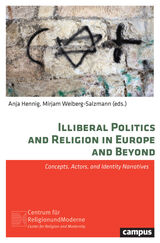
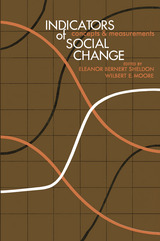
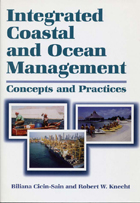
Biliana Cicin-Sain and Robert W. Knecht are co-directors of the Center for the Study of Marine Policy at the University of Delaware in Newark, Delaware and co-authors of The Future of U.S. Ocean Policy (Island Press, 1998).


Just over two decades ago, research findings that environmentally hazardous facilities were more likely to be sited near poor and minority communities gave rise to the environmental justice movement. Yet inequitable distribution of the burdens of industrial facilities and pollution is only half of the problem; poor and minority communities are often denied the benefits of natural resources and can suffer disproportionate harm from decisions about their management and use.
Justice and Natural Resources is the first book devoted to exploring the concept of environmental justice in the realm of natural resources. Contributors consider how decisions about the management and use of natural resources can exacerbate social injustice and the problems of disadvantaged communities. Looking at issues that are predominantly rural and western -- many of them involving Indian reservations, public lands, and resource development activities -- it offers a new and more expansive view of environmental justice.
The book begins by delineating the key conceptual dimensions of environmental justice in the natural resource arena. Following the conceptual chapters are contributions that examine the application of environmental justice in natural resource decision-making. Chapters examine:
- how natural resource management can affect a range of stakeholders quite differently, distributing benefits to some and burdens to others
- the potential for using civil rights laws to address damage to natural and cultural resources
- the unique status of Native American environmental justice claims
- parallels between domestic and international environmental justice
- how authority under existing environmental law can be used by Federal regulators and communities to address a broad spectrum of environmental justice concerns
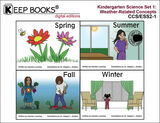
Stories include: Spring, Summer, Fall, & Winter.
Stories include: Spring, Summer, Fall, & Winter.
Age Level: 5/6
Grade Level: Kindergarten
Reading level: not leveled
KEEP BOOKS digital editions include text features and design elements that give beginning readers what they need to start reading on their own with high interest titles that they can easily manage.
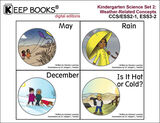
This set of four books offers engaging stories that combine features of early literacy learning while exploring weather-related concepts from Common Core State Standards and Next Generation Science Standards.
Stories include: May, Rain, December, & Is It Hot or Cold?.
Age Level: 5/6
Grade Level: Kindergarten
Reading level: not leveled
KEEP BOOKS digital editions include text features and design elements that give beginning readers what they need to start reading on their own with high interest titles that they can easily manage.
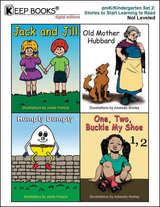
Stories include: Jack and Jill; Old Mother Hubbard; Humpty Dumpty; & One, Two, Buckle My Shoe.
Age Level: 3-5
Grade Level: preK-Kindergarten
Reading level: not leveled
KEEP BOOKS digital editions include text features and design elements that give beginning readers what they need to start reading on their own with high interest titles that they can easily manage.
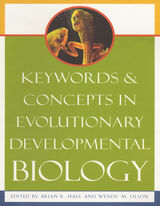
The new field of evolutionary developmental biology is one of the most exciting areas of contemporary biology. The fundamental principle of evolutionary developmental biology ("evo-devo") is that evolution acts through inherited changes in the development of the organism. "Evo-devo" is not merely a fusion of the fields of developmental and evolutionary biology, the grafting of a developmental perspective onto evolutionary biology, or the incorporation of an evolutionary perspective into developmental biology. Evo-devo strives for a unification of genomic, developmental, organismal, population, and natural selection approaches to evolutionary change. It draws from development, evolution, paleontology, ecology, and molecular and systematic biology, but has its own set of questions, approaches, and methods.
Keywords and Concepts in Evolutionary Developmental Biology is the first comprehensive reference work for this expanding field. Covering more than fifty central terms and concepts in entries written by leading experts, Keywords offers an overview of all that is embraced by this new subdiscipline of biology, providing the core insights and ideas that show how embryonic development relates to life-history evolution, adaptation, and responses to and integration with environmental factors.
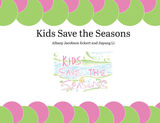
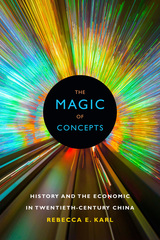
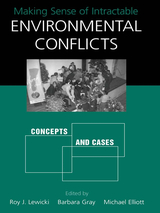
Despite a vast amount of effort and expertise devoted to them, many environmental conflicts have remained mired in controversy, stubbornly defying resolution. Why can some environmental problems be resolved in one locale but remain contentious in another, often carrying on for decades? What is it about certain issues or the people involved that make a conflict seemingly insoluble.
Making Sense of Intractable Environmental Conflicts addresses those and related questions, examining what researchers and experts in the field characterize as "intractable" disputes—intense disputes that persist over long periods of time and cannot be resolved through consensus-building efforts or by administrative, legal, or political means. The approach focuses on the "frames" parties use to define and enact the dispute—the lenses through which they interpret and understand the conflict and critical conflict dynamics. Through analysis of interviews, news media coverage, meeting transcripts, and archival data, the contributors to the book:
- examine the concepts of frames, framing, and reframing, and the role that framing plays in conflicts
- outline the essential characteristics of intractability and its major causes
- offer case studies of eight intractable environmental conflicts
- present a rich body of original interview material from affected parties
- set forth recommendations for intervention that can help resolve disputes
Conflicts examined include those over natural resource use, toxic pollutants, water quality, and growth. Specific conflicts examined are the Quincy Library Group in California; Voyageurs National Park in Minnesota; Edwards Aquifer in Texas; Doan Brook in Cleveland, Ohio; the Antidegradation Environmental Advisory Group in Ohio; Drake Chemical in Pennsylvania; Alton Park/Piney Woods in Tennessee; and three examples of growth-related conflicts along the Front Range of Colorado's Rocky Mountains.
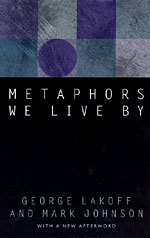
In this updated edition of Lakoff and Johnson's influential book, the authors supply an afterword surveying how their theory of metaphor has developed within the cognitive sciences to become central to the contemporary understanding of how we think and how we express our thoughts in language.

Modern philosophy finds it difficult to give a satisfactory picture of the place of minds in the world. In Mind and World, based on the 1991 John Locke Lectures, one of the most distinguished philosophers writing today offers his diagnosis of this difficulty and points to a cure. In doing so, he delivers the most complete and ambitious statement to date of his own views, a statement that no one concerned with the future of philosophy can afford to ignore.
John McDowell amply illustrates a major problem of modern philosophy—the insidious persistence of dualism—in his discussion of empirical thought. Much as we would like to conceive empirical thought as rationally grounded in experience, pitfalls await anyone who tries to articulate this position, and McDowell exposes these traps by exploiting the work of contemporary philosophers from Wilfrid Sellars to Donald Davidson. These difficulties, he contends, reflect an understandable—but surmountable—failure to see how we might integrate what Sellars calls the “logical space of reasons” into the natural world. What underlies this impasse is a conception of nature that has certain attractions for the modern age, a conception that McDowell proposes to put aside, thus circumventing these philosophical difficulties. By returning to a pre-modern conception of nature but retaining the intellectual advance of modernity that has mistakenly been viewed as dislodging it, he makes room for a fully satisfying conception of experience as a rational openness to independent reality. This approach also overcomes other obstacles that impede a generally satisfying understanding of how we are placed in the world.
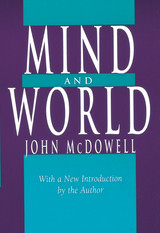
Modern philosophy finds it difficult to give a satisfactory picture of the place of minds in the world. In Mind and World, based on the 1991 John Locke Lectures, one of the most distinguished philosophers writing today offers his diagnosis of this difficulty and points to a cure. In doing so, he delivers the most complete and ambitious statement to date of his own views, a statement that no one concerned with the future of philosophy can afford to ignore.
John McDowell amply illustrates a major problem of modern philosophy—the insidious persistence of dualism—in his discussion of empirical thought. Much as we would like to conceive empirical thought as rationally grounded in experience, pitfalls await anyone who tries to articulate this position, and McDowell exposes these traps by exploiting the work of contemporary philosophers from Wilfrid Sellars to Donald Davidson. These difficulties, he contends, reflect an understandable—but surmountable—failure to see how we might integrate what Sellars calls the “logical space of reasons” into the natural world. What underlies this impasse is a conception of nature that has certain attractions for the modern age, a conception that McDowell proposes to put aside, thus circumventing these philosophical difficulties. By returning to a pre-modern conception of nature but retaining the intellectual advance of modernity that has mistakenly been viewed as dislodging it, he makes room for a fully satisfying conception of experience as a rational openness to independent reality. This approach also overcomes other obstacles that impede a generally satisfying understanding of how we are placed in the world.

The Federmanns live a pleasant but painfully normal life in the Munich suburbs. All that the three children really know about money is that there’s never enough of it in their family.
Every so often, their impish Great-Aunt Fé descends on the city. After repeated cycles of boom and bust, profligacy and poverty, the grand old lady has become enormously wealthy and lives alone in a villa on the shore of Lake Geneva. But what does Great-Aunt Fé want from the Federmanns, her only surviving relatives? This time, she invites the children to tea at her luxury hotel where she spoils, flummoxes, and inspires them. Dismayed at their ignorance of the financial ways of the world, she gives them a crash course in economics that piques their curiosity, unsettles their parents, and throws open a whole new world. The young Federmanns are for once taken seriously and together they try to answer burning questions: Where does money come from? Why are millionaires and billionaires never satisfied? And why are those with the most always showered with more?
In this rich volume, the renowned poet, translator, and essayist Hans Magnus Enzensberger turns his gimlet eye on the mechanisms and machinations of banks and politicians—the human greed, envy, and fear that fuels the global economy. A modern, but moral-less fable, Money, Money, Money! is shot through with Enzensberger’s trademark erudition, wit, and humanist desire to cut through jargon and forearm his readers against obscurantism.
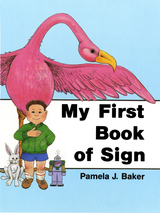
My First Book of Sign, a full-color alphabet book, gives the signs for 150 of the words most frequently used by young children. The vocabulary comes from recognized word list sources such as the Dale List of 769 Easy Words. The proportion of word category choices (nouns, modifiers, and verbs) is based on early language acquisition research.
Readers do not have to know American Sign Language to enjoy My First Book of Sign; the book provides explanations of how to form each sign. This is a very special alphabet book appropriate for all children who are just beginning to read.
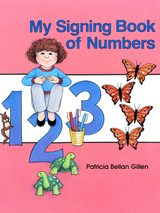
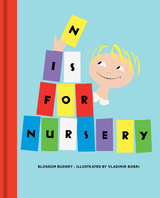
The letters of the alphabet are brilliantly brought to life in a bright nursery school, where the children learn and play. B is for building blocks . . . but also for blowing out the candles on a birthday cake! C is for the colorful chairs the children take when the teacher rings a chime. Lively pictures designed around each letter show the children dancing, singing, listening to stories, tickling one another, and even engaging in an exciting game of tug-of-war. The fun rhymes and imaginative words for each letter make N is for Nursery a great book for children just learning to read and to recognize letters and letter sounds.
Originally published in 1956, N is for Nursery is the most recent addition to the Bodleian Library’s children’s book imprint and the perfect book for children to take with them on a new adventure like starting school.
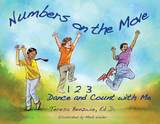
"Move with the numbers, count to the beat. Clap your hands. Tap your feet. Count one two three four, with your Head Shoulders Elbows Hands Arms Hips Knees Feet!"
Early childhood educator Teresa Benzwie believes that dance and movement foster imagination, which is essential to the learning process. Her philosophy—that creative movement helps children gain knowledge through the body—is incorporated in Numbers on the Move, an appealing and entertaining book that urges kids to dance, stretch, and move as they learn to count and play with numbers.
Featuring playful, full-color illustrations, this book offers dynamic activities for children, who learn most readily from experience. For parents and teachers, Benzwie provides additional games and activities to try with children. Kids will develop a concrete awareness of numbers as they connect in deep, direct ways with their own expressive movement.
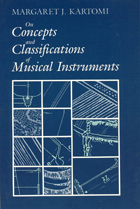
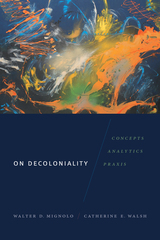
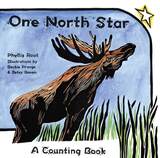
Five toads hop, four brook trout swim, three elk graze, two loons call, and one beaver gnaws on a paper birch tree, all under one North Star. Through bog and marsh, along river and lake, across prairie and into the woods, children learn what lives where by counting the creatures on foot or in flight, swimming or perching in exquisite woodcut and watercolor illustrations created by Beckie Prange and Betsy Bowen in an artistic collaboration. For those looking for more about the pictured wildlife, Phyllis Root includes fascinating facts and information on the state’s ecosystems and the plants and animals that make their homes there.

For nearly fifteen years Practical Decision Making in Health Care Ethics has offered scholars and students a highly accessible and teachable alternative to the dominant principle-based theories in the field. Devettere’s approach is not based on an ethics of abstract obligations and duties, but, following Aristotle, on how to live a fulfilled and happy life—in short, an ethics of personal well-being grounded in prudence, the virtue of ethical decision making.
This third edition is revised and updated and includes discussions of several landmark cases, including the tragic stories of Terri Schiavo and Jesse Gelsinger (the first death caused by genetic research). Devettere addresses new topics such as partial-birth abortion law, embryonic stem cell research, infant euthanasia in The Netherlands, recent Vatican statements on feeding tubes, organ donation after cardiac death, new developments in artificial hearts, clinical trials developed by pharmaceutical companies to market new drugs, ghostwritten scientific articles published in major medical journals, and controversial HIV/AIDS research in Africa. This edition also includes a new chapter on the latest social and political issues in American health care.
Devettere’s engaging text relies on commonsense moral concepts and avoids academic jargon. It includes a glossary of legal, medical, and ethical terms; an index of cases; and thoroughly updated bibliographic essays at the end of each chapter that offer resources for further reading. It is a true classic, brilliantly conceived and executed, and is now even more valuable to undergraduates and graduate students, medical students, health care professionals, hospital ethics committees and institutional review boards, and general readers interested in philosophy, medicine, and the rapidly changing field of health care ethics.
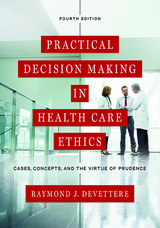
For more than twenty years Practical Decision Making in Health Care Ethics has offered scholars and students a highly accessible and teachable alternative to the dominant principle-based theories in the field. Raymond J. Devettere's approach is not based on an ethics of abstract obligations and duties but, following Aristotle, on how to live a fulfilled and happy life—in short, an ethics of personal well-being grounded in prudence, the virtue of ethical decision making.
New sections added in this revised fourth edition include sequencing whole genomes, even those of newborns; the new developments in genetic testing now provided by online commercial companies such as 23andMe; the genetic testing of fetuses by capturing their DNA circulating in the pregnant woman's blood; the Stanford Prison experiment and its relevance to the abuses at the Abu Graib prison; recent breakthroughs in the diagnosis of consciousness disorders such as PVS; the ongoing controversy generated by the NIH study of premature babies at many NICUs throughout the county, a study known as SUPPORT that the OHRP (Office of Human Research Protections, an office within the department of HHS) deemed unethical.
Devettere updates most chapters. New cases include Marlise Munoz (dead pregnant woman's body kept on life support by a Texas hospital), Jahi McMath (teenager pronounced dead in California but treated as alive in New Jersey), Margot Bentley (nursing home feeding a woman dying of end stage Alzheimer’s despite her advance directive that said no nourishment or liquids if she was dying with dementia), Brittany Maynard (dying 29-year-old California woman who moved to Oregon to commit suicide with a physician's help), and Samantha Burton (woman with two children who suffered rupture of membranes at 25 weeks and whose physician obtained a court order to keep her at the hospital to make sure she stayed on bed rest). Thoughtfully updated and renewed for a new generation of readers, this classic textbook will be required reading for students and scholars of philosophy and medical ethics.

Prosperity in the Twenty-First Century sets out a new vision for prosperity in the twenty-first century and how it can be achieved for all. The volume challenges orthodox understandings of economic models but goes beyond contemporary debates to show how social innovation drives economic value. Drawing on substantive research in the UK, Lebanon, and Kenya, it develops new concepts, frameworks, models, and metrics for prosperity across a wide range of contexts, emphasizing commonalities and differences. Departing from general propositions about post-growth to delineate pathways to prosperity, the volume emphasizes that visions of the good life are diverse and require empirical work co-designed with local communities and stakeholders to drive change. It will be essential reading for policymakers who are stuck, local government officers who need new tools, activists who wonder what is next, academics in need of refreshment, and students and people of all ages who want a way forward.
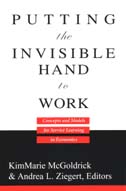
The two parts of this volume provide a theoretical basis for service learning and offer lessons gleaned from applying it in the classroom. The theoretical chapters outline the learning theory and models of service learning as they can be applied in economics. Service learning is introduced here as a technique that teaches students to "do economics." Also included are specific models of service learning and an overview of assessment issues. The applications chapters detail various examples of using service to enhance learning. These range from using a single service experience in a class to courses that use service experiences as the focus and context for learning economics. Course topics cover environmental and natural resources, statistics, econometrics and research methods, principles and economic issues, labor, the economics of gender, forensic economics, and development economics. Each application provides details regarding the institutional environment in which it was implemented, type of course, enrollment, and process through which student learning was enhanced. Handouts and abbreviated syllabi are included.
Economics educators have a stake in improving their students' long-term economic literacy. Service learning offers significant benefits beyond those offered by pedagogies traditionally found in economics classrooms and should be considered as a teaching strategy by economics professors everywhere.
Kim Marie McGoldrick is Associate Professor of Economics, University of Richmond. Andrea L. Ziegert is Associate Professor of Economics, Denison University.
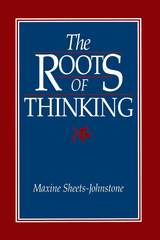
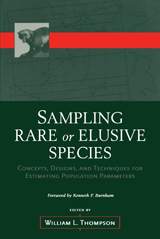
Information regarding population status and abundance of rare species plays a key role in resource management decisions. Ideally, data should be collected using statistically sound sampling methods, but by their very nature, rare or elusive species pose a difficult sampling challenge.
Sampling Rare or Elusive Species describes the latest sampling designs and survey methods for reliably estimating occupancy, abundance, and other population parameters of rare, elusive, or otherwise hard-to-detect plants and animals. It offers a mixture of theory and application, with actual examples from terrestrial, aquatic, and marine habitats around the world.
Sampling Rare or Elusive Species is the first volume devoted entirely to this topic and provides natural resource professionals with a suite of innovative approaches to gathering population status and trend data. It represents an invaluable reference for natural resource professionals around the world, including fish and wildlife biologists, ecologists, biometricians, natural resource managers, and all others whose work or research involves rare or elusive species.


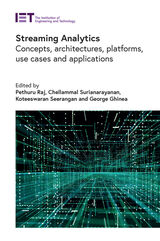
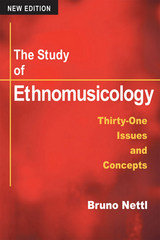
This book looks at the field of ethnomusicology--defined as the study of the world's musics from a comparative perspective, and the study of all music from an anthropological perspective--as a field of research. Nettl selects thirty-one concepts and issues that have been the subjects of continuing debate by ethnomusicologists, and he adds four entirely new chapters and thoroughly updates the text to reflect new developments and concerns in the field.
Each chapter looks at its subject historically and goes on to make its points with case studies, many taken from Nettl's own field experience. Drawing extensively on his field research in the Middle East, Western urban settings, and North American Indian societies, as well as on a critical survey of the available literature, Nettl advances our understanding of both the diversity and universality of the world's music. This revised edition's four new chapters deal with the doing and writing of musical ethnography, the scholarly study of instruments, aspects of women's music and women in music, and the ethnomusicologist's study of his or her own culture.

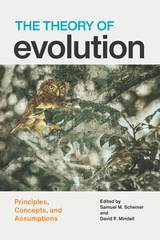
This book gives us that framework and synthesis for the twenty-first century. The Theory of Evolution presents a series of chapters by experts seeking this integration by addressing the current state of affairs across numerous fields within evolutionary biology, ranging from biogeography to multilevel selection, speciation, and macroevolutionary theory. By presenting current syntheses of evolution’s theoretical foundations and their growth in light of new datasets and analyses, this collection will enhance future research and understanding.

Alfred North Whitehead has never gone out of print, but for a time he was decidedly out of fashion in the English-speaking world. In a splendid work that serves as both introduction and erudite commentary, Isabelle Stengers—one of today’s leading philosophers of science—goes straight to the beating heart of Whitehead’s thought. The product of thirty years’ engagement with the mathematician-philosopher’s entire canon, this volume establishes Whitehead as a daring thinker on par with Gilles Deleuze, Felix Guattari, and Michel Foucault.
Reading the texts in broadly chronological order while highlighting major works, Stengers deftly unpacks Whitehead’s often complicated language, explaining the seismic shifts in his thinking and showing how he called into question all that philosophers had considered settled after Descartes and Kant. She demonstrates that the implications of Whitehead’s philosophical theories and specialized knowledge of the various sciences come yoked with his innovative, revisionist take on God. Whitehead’s God exists within a specific epistemological realm created by a radically complex and often highly mathematical language.
“To think with Whitehead today,” Stengers writes, “means to sign on in advance to an adventure that will leave none of the terms we normally use as they were.”
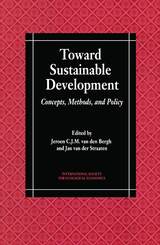
Toward Sustainable Development is a comprehensive and wide ranging exploration of the theoretical and practical aspects of the concept of sustainable development. Internationally known scholars present an in depth critique of traditional economic methods and ideas, and a new framework for analysis of issues of development and environmental policy. The book:
- outlines the historical development of the concept of sustainable development
- clarifies the many interpretations of what sustainable development is
- presents new and detailed assessments of the concepts, methods, and implementation of sustainable development policies
As well as explaining the conceptual and theoretical background, the book discusses methods and techniques, and examines issues of policy and implementation. It offers both critical observations on old approaches, and valuable guidelines for recent innovations.
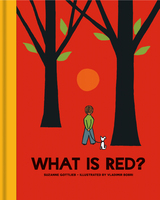
A joyous celebration of colors that will encourage young readers’ curiosity about the world around them, What Is Red? is packed with illustrations in bright, primary colors. Originally published in 1961, the book is one of the most recent additions to the Bodleian Library’s children’s book imprint.
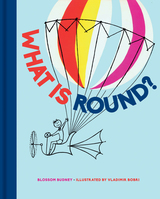
Many things in the natural world are round—the sun, the moon, a bird’s nest with three bright baby birds. So are the turning wheels of a train and a hot air balloon high in the sky. So are cakes, pies, cookies, and many other delicious things to eat!
Page by brightly colored page, What is Round? invites young readers to pick out the shape in the world around them, from the smallest raindrop to a big spectacular carousel. Many of the objects can be found in our own homes, like the clock that tells the time or the colorful decorations on a Christmas tree. Others, like the portholes of a passing ship, require a watchful eye. Striking and vibrant illustrations by Vladimir Bobri accompany the playful rhymes of Blossom Budney in this lively look at this shape that can be found in the most unexpected places.
Originally published in 1954, What is Round? will make a wonderful addition to any child’s library, and it’s the perfect story to read aloud.
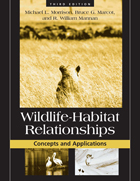
Now in its third edition, Wildlife-Habitat Relationships combines basic field zoology and natural history, evolutionary biology, ecological theory, and quantitative tools in explaining ecological processes and their influence on wildlife and habitats. Also included is a glossary of terms that every wildlife professional should know.
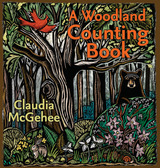
READERS
Browse our collection.
PUBLISHERS
See BiblioVault's publisher services.
STUDENT SERVICES
Files for college accessibility offices.
UChicago Accessibility Resources
home | accessibility | search | about | contact us
BiblioVault ® 2001 - 2024
The University of Chicago Press









